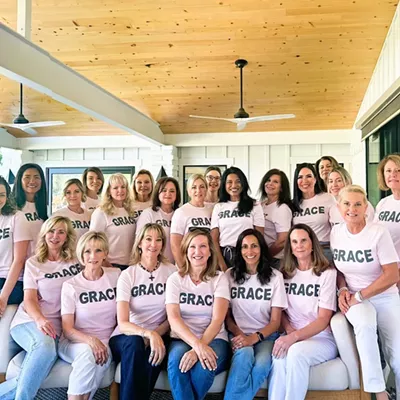The top spot at the Pima County Attorney's Office is opening up for the first time in nearly a quarter of a century after Pima County Attorney Barbara LaWall announced her intention to retire last October at the end of her sixth term.
The competition in this year's Democratic primary is stiff: Former public defender and local defense attorney Laura Conover faces veteran county prosecutors Jonathan Mosher and Mark Diebolt.
To make the race even more interesting, whichever candidate wins the primary on Aug. 4 will become the next county attorney since no Republican challengers threw a hat into the ring.
But before we take a look at the candidates, let's examine what the job entails through the eyes of the woman who presided over the position for more than 23 years.
In 1996, LaWall became the first woman elected as Pima County Attorney after previously spending 20 years as a trial prosecutor, head of the office's criminal division and administrative chief deputy. Her predecessor, Stephen D. Neely, also served a 20-year term as the county attorney before that. To be a county attorney means having the power to decide what sort of crimes will be prosecuted and how they will be prosecuted, once a case is referred to the office by law enforcement.
LaWall said her cumulative experience before taking office "contributed enormously" in being able to perform her duties at the top. The job takes more than a law degree, she said. Leadership, administrative experience and "a strong devotion to serving the public while holding criminals accountable" are the basic requirements needed to be the next Pima County Attorney, according to LaWall.
"All of my previous experience contributed enormously to my ability to do the job and I think this job requires more than just having a law degree," LaWall said. "It requires someone who demonstrates leadership and has proven administrative experience. Someone with a strong devotion to serving the public while holding criminals accountable."
Furthermore, to be an effective county attorney the proper candidate should have the "mindset" of a prosecutor and be well steeped in "a prosecutor's culture," LaWall said.
"I strongly believe that somebody needs the experience of being a prosecutor. It's not an easy job. It requires immersion into a prosecutor's culture and mindset," LaWall said. "A lot of people who have a law degree think they are qualified to run the office simply because they're a lawyer and that's really not the case."
Other than having a prosecutor's mind, LaWall believes management and administrative experience are the next most important skills a county attorney should have.
"With the exception of making really tough prosecution decisions, management is the job," LaWall said. "For instance, just implementing a case management system that is effective and efficient requires a great deal of knowledge of running an office. "
On top of that, LaWall said her staff would have "a greater respect" for the incoming candidate-elect if they have a track record of "proven administrative experience and demonstrative leadership in prosecution."
"I'm going to be frank," LaWall said. "This is not a job for somebody who has been defending criminals and doesn't have any prosecution experience whatsoever."
Jonathan Mosher
Jonathan Mosher made a name for himself as a skilled prosecutor whose work ethic helped him rise from deputy county attorney to chief criminal deputy during his 15 years serving the county attorney's office.
Mosher also has LaWall's full support to take over as county attorney should he win the primary.
"Jonathan is someone whose preparation for and commitment to serve in this office is beyond a doubt and neither of his opponents begin to match his qualifications to do the job," LaWall said. "He has supervised the entire general division, he's been on my leadership team for well over a year, working at the highest levels as chief trial counsel and then chief of the criminal division."
Mosher said his fascination with being a prosecutor blossomed during his middle school years when he was a "skinny, little debate nerd who would get bullied." Instead of fighting back, Mosher channeled his anger into his ability to debate and won the state championship his first year on the debate team.
"When I saw I was good at (debating) I started to think I wanted to be in the courtroom going after people who do horrible things to other people," Mosher said. "Long before law school, I knew this is what I wanted to do for sure."
However, Mosher's dream of becoming a prosecutor stalled after law school when he started working as a corporate attorney for large law firms in Los Angeles. While the money was good, Mosher said he began to notice other areas of his life were in disarray due to alcohol addiction.
"Once I sobered up and took a look at my life I was like, 'Oh this is all about money.' I don't want to be a part of this workaholic, alcoholic lifestyle," Mosher said. "I decided I wanted to be a prosecutor, so I went and did that."
Mosher decided to make a new start in Tucson by accepting a job with the county attorney's office in 2005.
"As soon as I came to Tucson and started prosecuting I went straight into major violent felony prosecutions and I've never looked back," Mosher said. "I love helping my community and serving the crime victims that have been horribly harmed. It's a passion."
Mosher said his experience with being an addict and his experience as a prosecutor has shaped his opinion on how to implement criminal justice reform in Pima County. Mosher's reforms include ending the prosecution of possession of marijuana cases on his first day and expanding the county's Drug Treatment Alternative to Prison program (DTAP) so drug addicts get treatment instead of jail time. The program currently has 60 participants, but Mosher said he would like to expand that number to 1,600.
His goal is for County Attorney's Office to focus on more serious offenses like gun violence, domestic violence and scams against the elderly, he said.
"We don't want prosecutors who don't have the time to devote to serious crimes because they're dealing with personal possession of marijuana. We will simply stop prosecuting those cases if I'm elected whether the decriminalization effort passes or not," Mosher said. "Even if it's heroin or methamphetamine. I simply won't allow somebody who possesses that to go to prison."
Critics of Mosher point out the prosecutor recently had a murder conviction overturned by the Division 2 Arizona Court of Appeals for making an "improper argument" during the closing statements of State v. Dansdill, a first-degree murder and attempted armed robbery case. Mosher argued that felony murder was less severe than first-degree murder which might insinuate to a jury the penalty would be less severe if the person was convicted.
In 2019, the appellate court agreed with Dansdill that Mosher made an improper argument which may have misled the jury. Dansdill's convictions were overturned and he was awarded a new trial.
Chief Judge Peter Eckerstrom penned the court's opinion.
"The prosecutor's references to punishment were also inaccurate and misleading. Felony murder is not, in any meaningful respect, a 'less serious' or 'lesser' offense than premeditated murder. Rather, under Arizona law, they are 'simply two forms of first-degree murder,'' Eckerstrom wrote. "We acknowledge the prosecutor was entitled to argue that the state bore no burden to show Dansdill intended to kill. But the state has failed to explain how remarks about the comparative 'seriousness' of premeditated and felony murder were logically pertinent to making that point."
Mosher maintains his argument was "a technical error of language" and said he respects the court's decision but finds it "difficult to swallow" that he knew what he was saying was wrong. In fact, Mosher made the same argument during a previous case, State v. Urbina, and the same appellate court upheld Mosher's argument stating in their 2017 opinion, "the prosecutor did not misinform the jury that the consequences of the verdict were minimal."
"Urbina was a case before Dansdill where I made that same argument and it was appealed," Mosher said. "The appellate court said, 'No problem, we're not reversing.' Strangely in the Dansdill opinion, they say that somehow I was on notice and knew it was wrong when in fact I previously had an appellate court say it was ok and reject the challenge?"
Mark Diebolt
Candidate Mark Diebolt believes his 23-year record as a deputy county attorney speaks for itself.
The prosecutor has over 320 felony jury trials—including 50 homicide cases—under his belt since beginning his career with the county attorney's office in 1997. Due process, fairness and accountability is his creed as a prosecutor, he said.
"I'm probably one of the most prolific violent crimes prosecutors in Arizona," Diebolt said. "That's what I've been trying to do, is hold people accountable for the violent crimes they commit."
Diebolt has also received several letters of reprimand in his over two decades working for the county, ranging from mishandling of prosecution and failure to disclose exculpatory evidence to retaining and viewing emails of a pornographic nature on his work computer.
In 2019, Diebolt was reprimanded for "neglect of duty" and "failure to satisfactorily perform job duties and responsibilities" for failing to file a response to the defense's motion to suppress evidence in a first-degree murder case, even after asking the court for an extension. Diebolt said the oversight was due to prosecuting another homicide case which lasted longer than expected, as well as a heavy case-load.
"In that period of time, I did complete a homicide trial which took me into a second week and that trial I was doing all by myself so I didn't get caught up with the paperwork," Diebolt said. "That happens sometimes, but there is no requirement that a response is required after every single motion that's filed."
The Pima County Attorney's Office disagreed with Diebolt's reasoning in their 2019 Letter of Reprimand, insisting "There is no excuse for not responding to the motion in the first instance. Nor is there any excuse for not responding after the extension was granted." The letter went on to state, "Your actions have discredited the office and may have caused significant harm to the state's ability to prevail at trial in a first-degree murder case."
In 2015, the prosecutor found himself in hot water after failing to disclose a "free-talk" conversation that may have potentially exonerated a person being tried for murder in a separate case. The case in question was being prosecuted by Diebolt's supervisor at the same time.
"We sit down and talk with somebody who gives us information. Whether it's credible or not, whether it's truthful or not, I don't know. I rely on the detective I work with to get to the bottom of it," Diebolt said. "Later on, when the issue was brought to my attention I didn't believe that it was new information because we already had a name. Going back, I definitely would have handled it differently."
The county's 2015 Letter of Reprimand points out, "It is important to note that Tucson Police Department Detective Brett Barber was present for the free talk. Detective Barber asked a number of questions during the free talk that indicated he knew about the murder of Roger Catalan. You failed to ask Detective Barber about the Catalan homicide case to determine whether that case was being prosecuted by this office. Had you done so, you would have learned that, in fact, this office was prosecuting the case. Your lack of attention to detail and failure to exercise due diligence on this issue is inexcusable for a prosecutor with your years of experience."
In 2009, Diebolt received a Letter of Counseling for having used his office email account to "receive, intentionally view during work hours, and retain in your in-box materials of a pornographic and X-rated nature, as well as transmit email of a discriminatory nature," according to the letter.
"I never opened it. I never looked inside of it. It was sent to me by someone...you can't block them or at least you couldn't then," Diebolt said. "But the rule doesn't say you can't receive those because you can't control who sends those to you. It says you may not download it, you may not open it, you may not forward it. All of which I did not do."
The 2009 Letter of Counseling indicates there were approximately 20 other occasions in a 60-day period where Diebolt had "received, viewed during work hours, and retained in your email inbox emails and attachments containing pornographic photographs and videos that had been sent to you." The letter also said Diebolt made no attempt to reach out to IT staff to correct the matter.
The office restricted Diebolt from receiving personal messages to his business email and his account was monitored for a one-year period. The prosecutor complied fully with the department's corrective actions and his Letter of Counseling was ultimately removed from his departmental personnel file by 2010.
"I think we're all human and make mistakes," Diebolt said. "Certainly we see that every day in every life."
Laura Conover
Laura Conover's journey into the world of criminal justice began with following the Louis Tayor case when she was a teenager in the 1990s. Taylor, who is Black, was convicted of the 1970 Pioneer Hotel Fire at 16 years of age and spent 42 years in prison on 28 arson murder charges. His conviction was ultimately overturned and Taylor was released in 2013.
"I wanted to study the system of justice from the ground up. As much as I could, I wanted to devote all my studies and career to it," Conover said. "The Louis Taylor case was part of that because starting in the '90s, every two years he would come before the parole board and that case haunted so many of us who grew up here." By the time she was 19 years old, Conover began interning with the federal public defender's office, which led her to study at the University of Arizona's James E. Rogers College of Law, she said. Conover then worked for Pima County as a public defender for four years after graduating from law school. As a bilingual speaker, she easily made the jump from the county to become a federal public defender for eight years.
The self-proclaimed policy geek said those eight years inspired her to run for county prosecutor after watching the Obama Administration implement sweeping reforms at the Department of Justice.
"I'm such a policy geek. I watched the Obama Administration make massive changes that we had been trying to achieve in federal court. Bringing in best practices and moving people into probation instead of prison," Conover said. "I saw a lot of reforms I devoted my life to start to take shape and I saw head prosecutors making it happen."
In 2016, Conover started her own private practice as a criminal defense attorney but eventually became a criminal justice attorney, helping anyone she could regardless of their financial situation. Soon, she became a victim's legal advocate and worked with larger companies to employ recently paroled prisoners.
When the 2018 federal shutdown loomed, Conover received a judicial appointment to manage 400 defense attorneys who are contracted by the United States District Court for the Federal District of Arizona. These 400 attorneys didn't know how they were getting paid for their services due to the federal shutdown and it was Conover's job to try to answer their concerns while making sure they continued their duties.
"These were 400 dynamic, colorful, unique personalities and it turns out, I love herding cats, so to speak. I absolutely love it." said Conover, using an expression about the difficulty of managing different temperaments. "The government did shut down as predicted and they went unpaid for a full financial quarter, with no notice, over the holidays. That was the start of my management training. It was a baptism by fire."
Conover said all of these experiences have prepared her to lead the Pima County Attorney's office. As a reform candidate, she said she would begin offering more treatment-based solutions for non-violent crimes—especially non-violent drug-related arrests—that tend to cost less than incarceration.
"There are people in our community that shouldn't be in our system at all. The system is not a place to treat addicts," Conover said. "The system should be reserved for those who are engaging in separate criminal conduct that is an ongoing harm to the community and needs to be in the system."
Conover also plans on focusing on consumer protection. If elected, she said she'll prosecute fraud cases and scams by reopening the county's financial crimes unit that's been shuttered for 20 years. Additionally, Conover said she'll prosecute wage theft, and mortgage and loan application discrepancies.
"We let it go and now fraud and scams are rampant all over our county. It's a kind of elder abuse that makes my blood boil," Conover said. "On the other side of it, wage theft and mortgage applications and loan application irregularities only keep our hard-working families down, instead of advancing.
While all of this year's candidates are promising reform, Conover said her reforms will be "outcome-driven" by tracking data and sharing it with the community. She cites law enforcement complaints about not having reliable data from the county attorney's office to determine if their policies are working or not.
"The community needs actual results. We are going to be transparent and share data with the public so outcomes can be tracked," Conover said. "These men devoted their careers to an office that broke the all-time record in felony filings last year, as a Republican Sheriff told us crime was down. They had their chance to stop the machine and that didn't happen."









